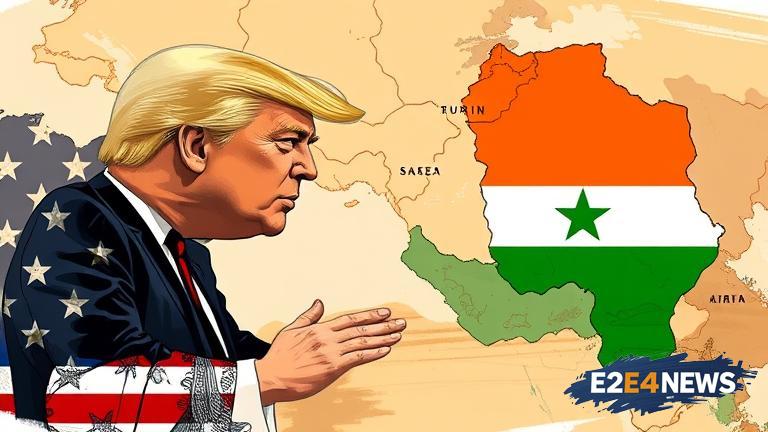The Sahel region, spanning across several countries in West Africa, has been plagued by instability and conflict in recent years. The region is home to a plethora of valuable minerals, including gold, uranium, and phosphates, making it a coveted destination for foreign investors. The Trump administration, in its quest for economic dominance, has been accused of making deals with junta-controlled governments in the region, offering military support in exchange for access to these minerals. This move has been met with widespread criticism, with many arguing that it undermines democratic values and perpetuates human rights abuses. The Sahel region has been a hotbed of terrorist activity, with groups like Al-Qaeda and ISIS operating in the area. The US has been involved in the region for several years, providing military support to countries like Mali, Niger, and Burkina Faso. However, the Trump administration’s approach has been criticized for being overly focused on economic interests, rather than addressing the root causes of instability in the region. The deal has also been criticized for its lack of transparency, with many details remaining classified. The US has a long history of involvement in the Sahel region, dating back to the Cold War era. However, the current approach has been marked by a significant shift towards militarization, with the US providing significant amounts of military aid to the region. This has led to concerns about the potential for human rights abuses, as well as the impact on local communities. The Sahel region is home to several countries, including Mali, Niger, Burkina Faso, and Mauritania. Each of these countries has its own unique set of challenges, ranging from poverty and corruption to terrorism and instability. The US has been working closely with these countries, providing military support and training to help them combat terrorist groups. However, the approach has been criticized for being too narrow, focusing primarily on military solutions rather than addressing the underlying causes of instability. The region is also home to several valuable mineral deposits, including gold, uranium, and phosphates. These minerals are highly sought after by foreign investors, and the US is no exception. The Trump administration has been accused of prioritizing economic interests over human rights and democratic values. The deal has also been criticized for its potential impact on local communities, who may be displaced or harmed by the extraction of minerals. The US has a responsibility to ensure that its actions in the region are transparent and accountable, and that the rights of local communities are protected. The Sahel region is a complex and challenging environment, requiring a nuanced and multifaceted approach. The US must work closely with local governments and communities to address the root causes of instability, rather than simply providing military support. This includes investing in economic development, improving governance, and promoting human rights. The US must also be transparent about its actions in the region, ensuring that all deals and agreements are publicly disclosed and subject to scrutiny. The Trump administration’s approach to the Sahel region has been marked by controversy and criticism, with many arguing that it prioritizes economic interests over human rights and democratic values. The region is a critical component of US foreign policy, and the US must ensure that its actions are guided by a commitment to transparency, accountability, and human rights. The US must work closely with local governments and communities to address the complex challenges facing the region, and to promote a more stable and prosperous future for all. The Sahel region is a vital component of US foreign policy, and the US must ensure that its actions are guided by a commitment to human rights, transparency, and accountability. The region is home to a plethora of valuable minerals, and the US must ensure that its actions are not driven solely by economic interests. The US must prioritize the rights and interests of local communities, and work to promote a more stable and prosperous future for all. The Trump administration’s approach to the Sahel region has been marked by controversy, and the US must ensure that its actions are guided by a commitment to transparency, accountability, and human rights. The region is a complex and challenging environment, requiring a nuanced and multifaceted approach. The US must work closely with local governments and communities to address the root causes of instability, and to promote a more stable and prosperous future for all.
